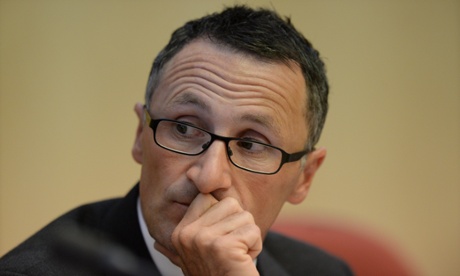Committee asks for ‘technical issues’, including meaning of ‘terminal illness, to be clarified

A federal Senate inquiry has called for a conscience vote on a bill allowing terminally ill people to legally end their lives, but asked that key technical issues with the legislation be clarified.
The draft bill, tabled by the Greens senator Richard Di Natale, would allow terminally ill people over the age of 18 to “die with dignity”, and grant medical professionals who provide the service immunity from prosecution.
The person asking for life-ending services must be “mentally competent”, suffering from a terminal, incurable illness, and have three doctors, including a psychiatrist, approve their request.
The Senate committee on legal and constitutional affairs, which is dominated by Coalition members, cited expert advice from the Australian Medical Association and others calling for “technical issues” in the bill to be clarified.
Among these was the meaning of “terminal illness”, a term the Medical Oncology Group of Australia said “has no precise definition”, and which one Christian group warned could be interpreted to include type-2 diabetes or frailty.
But if the bill was introduced, “party leaders should allow senators a conscience vote”, the committee chairman, LNP senator Ian Macdonald, said.
Di Natale said the draft bill was an opportunity for a national debate on how best to implement the reform.
“The committee’s report has highlighted some areas that need further discussion, which I intend to do with parliamentary colleagues from all sides before proceeding with the bill,” he said.
He called on the prime minister, Tony Abbott, and Labor to back a conscience vote.
Evidence of opinion polling submitted to the inquiry showed that support for a voluntary assisted dying regime has wavered for the past decade between 70% and 85%.
Macdonald said on Monday that his support for euthanasia was driven by his mother’s struggle to end her life after being paralysed by a stroke.
A private member’s bill to legalise euthanasia was narrowly defeated in Tasmania in November last year. It was briefly permitted in the Northern Territory from July until December 1996 until the federal Liberal MP Kevin Andrews introduced a federal law overturning the territory legislation.
One of the key proponents of the Northern Territory right-to-die legislation was the euthanasia activist Philip Nitschke, whose medical registration was suspended in July by the Medical Board of Australia.
On Monday the medical tribunal began hearing Nitschke’s appeal against the suspension.
The board claims Nitschke counselled a depressed but otherwise healthy man, Nigel Brayley, to end his life. Nitschke denies the claim.
